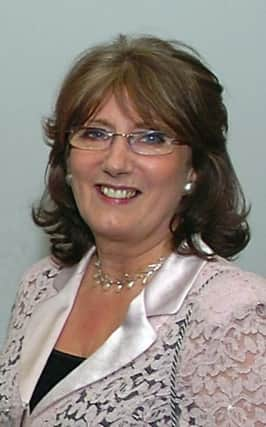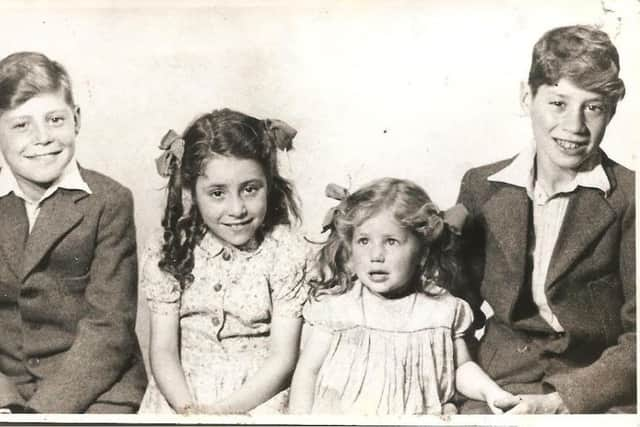The Nostalgia Column with Margaret Watson


Peter Gibbard recently wrote about his experiences of growing up in Dewsbury during the war and described the day his house in Old Bank Road was bombed.
This week, George Pickles, an old school friend of Peter’s, writes about his memories of the nights when German bombers flew over Dewsbury.
Advertisement
Hide AdAdvertisement
Hide AdPeter and George first met as toddlers when attending Knowles Hill Council School shortly after Peter’s house had been bombed.


George, who later went to live in the Liversedge area, is now living in Ripon where he is the City’s Hornblower.
The following is a graphic account of his childhood memories of the war:
“In 1940 our family was given a council house on the newly developed Dewsbury Moor Council Estate.
Advertisement
Hide AdAdvertisement
Hide Ad“A year later Peter and his family joined us on the estate after losing their home.


“Our family consisted of Mam and Dad, my brother Wilfred, who was a little over a year older than me, and baby sister Pat. My sister Rosemary was born later.
“Dad had been a coal miner since he was 14-year-old and consequently, just like all his coal miner colleagues, wasn’t called up to serve in the Forces at the outbreak of war. Instead he was directed to stay in the mines to keep the supply of coal flowing.
“However, these miners still had to take up Civil Defence roles during out-of-work hours, and my dad was appointed the ARP Warden for our area.
Advertisement
Hide AdAdvertisement
Hide Ad“When on duty he wore a black uniform with a black steel helmet with a white ‘W’ on the front. The Civil
Defence HQ was in the cellars under our school, and the Civil Defence men would take turns in spending all night there to keep the place operational.
“Dad would patrol the local streets into the early hours of the morning making sure that no lights were showing in any houses in breach of the blackout regulations.
“I remember quite well the night when Peter’s house was bombed. My brother Wilfred and I and little sister Pat were in the house with our Mam when the air raid sirens started up
Advertisement
Hide AdAdvertisement
Hide Ad“We didn’t take much notice at first because we’d had several false alarms prior to that, but when the anti-aircraft guns on top of Caulms Wood opened up we knew it was serious.
“Mam put little Pat under the kitchen table with a pillow and a blanket because modern council houses didn’t have cellars.
“There was a large communal air raid shelter situated a few gardens away from our house, and Mam suggested that me and Wilfred would be safer there and told us to run to it.
“We set off but soon had to turn back because the red hot pieces of metal from the flack of the guns on Caulms Wood were exploding in the air and showering down on us.
Advertisement
Hide AdAdvertisement
Hide Ad“We got back in the house as the flack was bouncing off the roof and walls around us, but fortunately, although slightly hit by some of the hot metal, we weren’t seriously hurt.
“Dad, with bits of red-hot flack bouncing off his steel helmet, was out on the streets shouting at everyone to get indoors or get to the nearest air raid shelter.
“I also recall on the odd occasion when the sirens would sound, the children in school would be lined up in the playground, and, after being counted, would be marched in a neat line to the school air raid shelter.
“The entrance to the shelter was via a large wooden door in the high wall surrounding the playground, and inside it was a long corridor with seats down each side with lights down the centre of the roof.
Advertisement
Hide AdAdvertisement
Hide Ad“It is only when I look back that I realise all the teachers except Mr Broughton were female. They all had an appearance of the typical old fashioned sombre spinster.
“They radiated authority, and in return automatically attracted our respect.
“You trusted them to look after you. They had much to contend with and had very little to teach us with; it was all ‘chalk and talk’.
“I think the reason there were no male teachers around was because they would have been called up to serve in the Forces, and likewise, the younger female teachers would have been put to more important wartime work.
Advertisement
Hide AdAdvertisement
Hide Ad“The Dewsbury and Spen Valley area, believe it or not, was considered a reasonably safe part of the country during the war.
“Consequently, some evacuees were sent to our area, some of them to our estate, and at least one was in our class at school.
“Rationing was quite severe and it got worse when the war ended. At the end of the war, bread was put on ration for the first time.
“Peter and I would be about 17 years old when rationing eventually ended, which was about seven or eight years after the war ended.
Advertisement
Hide AdAdvertisement
Hide Ad“Peter and I moved to Central Victoria School in Dewsbury and we played in the school orchestra. We both played in the first violin section, and my brother Wilfred played the cello.
“On leaving school, I took up an apprenticeship with T.S Harrison and Sons, Union Road, Heckmondwike.
“I also studied engineering at Batley Technical College evening classes.”
GEORGE has written another account describing where his family was the day war broke out, and also an account of his National Service years in the RAF, which will be published in future columns.
Advertisement
Hide AdAdvertisement
Hide AdIn the meantime if you wish to know more about George’s role as Ripon’s Hornblower, log on to http/the-ripon- hornblower.webs.com
Anyone wanting to share their memories, please contact myself by emailing [email protected]. I will be very happy to hear about your memories.